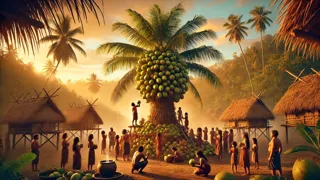Introduction
On the far western edge of the Pacific lies the islands of Samoa, a realm of sun-warmed sands, lush rainforests, and crystalline lagoons teeming with life. In the heart of this archipelago, generations of families cling to oral traditions and ancestral knowledge that bind them to the land and the sea. Yet there came a season when the sky withheld its rains, the rivers dwindled to trickles, and the breadfruit groves withered under a relentless sun. As hunger crept into the village, elders spoke of a prophecy hidden in the whispering palms and an ancient power dwelling where coral meets tide. A boy named Fetu rose from his slumber at dawn, drawn by a steady rhythm in the wind and a hush that fell over the palms. He carried nothing but courage and an instinct older than memory. Guided by dreams of silver water pouring from heavenly shells, he set his bare feet against the cool sand, determined to follow the call that pulsed through every frond above him. With each step, the scent of sea salt mingled with the sweet hum of cicadas and the soft murmur of distant waves, promising possibilities that reached beyond mortal clay. Fetu sensed that only by honoring unseen spirits could his people be saved—and only by venturing into unfamiliar depths could he uncover the secret that would shape generations to come.
The Boy's Journey to the Sacred Shore
A thick shimmer of heat rose from the cracked earth surrounding a small Samoan village. Each palm tree seemed to stand as a silent sentinel, its battered fronds whispering warnings of a land stretched thin by months without rain. The thatched homes rested in shadow beneath towering rainforests, yet even the broad leaves dripped only with dust. Children huddled around smoky fires, trying to coax flame from damp tinder, while mothers pressed sun-scorched taro into meager loaves. The salty breeze carried faint prayers to the rising sun, and Fetu could almost hear his ancestors urging him to step beyond familiar paths. Without a moment’s hesitation, he wrapped himself in a simple tapa cloth, tied his hair with a strand of pandanus, and slipped quietly through the hammock of vines draping each hut. He paused at the village well, its wooden bucket suspended over cracked stone, before setting his gaze toward the distant shimmer of the reef. In that instant, resolve twisted inside him like a coiling rope—this journey would decide the fate of every heartbeat in the settlement.

Before dawn had fully broken into day, Fetu found himself at the threshold of the rainforest trail, where vines coiled like giant serpents around ancient banyans. Golden morning light filtered through emerald leaves, painting dappled patterns on the moss-carpeted ground. Birds with bright yellow plumage darted through branches, calling out in a language older than memory. Fetu’s footsteps barely rustled the loamy earth as he navigated roots that snaked across the path, each one a reminder that the island lived and breathed alongside its people. He carried no offering but a carved wooden bowl, empty and eager to be filled with whatever answer the spirits might offer. Every breath he drew tasted of possibility and fear, woven together like coral and current. Shadows danced at the edge of his vision, but he carried onward, trusting the rhythm he could feel pulsing beneath his soles. Hidden among ferns and wild ginger, he glimpsed tiny crabs scuttling like red comets, and the distant roar of waterfalls pulled him deeper. Each step felt as though he were threading a tapestry of ancestral footprints, winding toward a destiny etched in saltwater and stone.
After hours of solitary travel, the trees gave way to steep cliffs overlooking a vast lagoon. Fetu perched at the edge, the weight of his mission pressing against his chest like a heavy shell. Below, waves broke against coral outcroppings in rhythmic pulses that matched the beating of his heart. He took the wooden bowl and tipped it forward, inviting the sea to reveal its secrets. A single silver fish leapt from the water, its scales flashing like fallen stars, and vanished back into the depths. In that magical instant, Fetu sensed a voice not made of words but of currents—a call to question, to prove his worth. He knelt and pressed his forehead to the rock, offering silent reverence to forces beyond sight. Salt spray cooled his skin, and he closed his eyes as the wind stirred memories of childhood games along tide pools. Deep within his chest, a spark of hope ignited, as if the ocean itself had chosen him.
There was no turning back. With renewed determination, Fetu slid down the rocky face and plunged into the crystalline water, feeling it swirl around his limbs like liquid jewels. The coral reef greeted him with brilliant hues of orange and purple, inhabited by swaying anemones and myriads of darting fish. Deeper still, the floor of the ocean opened up into an otherworldly grove of seaweed forests that shimmered in shafts of sunlight. He stretched out the bowl and waited, trusting that something would fill its emptiness. Minutes stretched into eternity, then a gentle current drifted grains of golden sand into the hollow. This offering carried a faint echo of voices, as though the sea itself had whispered secrets into each granule. Clutching the precious sand, Fetu surfaced, lungs burning but spirit soaring, certain that the next step would bring the answers he so desperately sought.
Exhausted yet unwavering, Fetu climbed back up the cliffs under a sky now painted orange and purple by the setting sun. He cradled the bowl filled with sand and water and pressed it to his lips, tasting salt and earth fused in perfect harmony. He spoke softly to the wind, chanting an ancient phrase taught by his grandmother, a prayer for balance between land and sea. All around him, the coconut palms rustled in hushed acknowledgment, their fronds bowing as if in silent applause. He could feel a presence gathering in the twilight—the spirit of the ocean rising to meet his courage. In that sacred hour, Fetu pledged himself to the island’s future, ready to pay any price. He would carry the ocean’s gift back to his people, even if it meant giving his very self to take root.
Trial of the Ocean Spirit
As dawn broke over the lagoon, Fetu returned to the tide pools with the wooden bowl still heavy in his hands. Soft light spilled across shallow waters, revealing patterns of silver fish darting around his feet. He knelt at the water’s edge and called out in a steady voice, offering the sand as tribute to the ocean’s unseen powers. For a long moment, only the whisper of tides responded—then the sea began to swirl and rise. A figure emerged, woven of seafoam and moonlight, with eyes like polished shells. The ocean spirit had answered. Its voice rippled through the air, gentle as a lullaby yet strong as a storm surge, challenging Fetu to prove his heart was true and unyielding. Fetu felt his pulse quicken, understanding that he stood at the threshold of a trial older than any memory. He nodded, placing the bowl at the spirit’s feet, ready to accept whatever tests would follow.

The first trial spoke of sacrifice and bounty: he must gather the purest water separated by the ocean floor and bring it to the thirsty palm of the island. With a silent prayer, Fetu dove beneath crashing waves and found himself enveloped in a world of dancing light and kaleidoscopic coral. Starfish clung to jagged rocks, eels slipped through hidden crevices, and currents tugged at his limbs like playful children. He pressed the wooden bowl into the soft seabed where a cluster of natural springs bubbled with crystal clarity. Lifting it carefully against the weight of the deep sea, his lungs burned, but he never hesitated. When he resurfaced, the essence of the ocean pulsed within the bowl, radiating life and promise. Each breath he took above water felt like victory, but Fetu knew the spirit’s gaze never wavered, waiting for him to fail or flourish. The salt stung his eyes, and his muscles ached with every movement, but his resolve remained unbroken, tempered by the belief that this water might be the first drop of salvation for his people.
For the second trial, the spirit demanded he carry a sacred shell carved from an ancient conch across a reef riddled with sharp coral teeth. As the sea calmed to a gentle pulse, Fetu wrapped the conch in woven pandanus fibers and slipped into thigh-deep surf. Each cautious step brought agony to his bare feet, the coral’s jagged edges tearing at his skin, drawing thin rivers of red. Yet he moved steadily forward, envisioning the smiles of children with full bellies and elders sipping sweet coconut water once again. The tides threatened to shift with every heartbeat, but he remained steadfast, leaning on his inner strength. When he reached the reef’s crest, battered but unbowed, the spirit hovered above the waves, its form luminous and proud. He offered the shell without a word, letting his blood and sand mix in silent testimony to his perseverance.
The final trial tested the truth within his own spirit. Fetu was led to a secluded cove where the water lay still and black as polished obsidian. There, the ocean spirit instructed him to surrender the wooden bowl and close his eyes, allowing the sea itself to judge whether his devotion ran deeper than fear. Heart pounding, Fetu released the bowl, watching it drift toward the spirit’s waiting hands. A hush fell over land and sea as he felt an unseen current swirl around his ankles, then surge up his knees, his waist, his chest, until the ocean embraced him fully. For a breathless moment, he teetered between two worlds, yet he did not resist. Instead, he whispered a vow to bind his fate to the island’s heart. The spirit’s voice echoed in his mind like distant thunder, declaring that true sacrifice was worth every cost. In that luminous hush, Fetu understood the price of hope.
When he opened his eyes, he found himself standing at the threshold of transformation, the wooden bowl now cradling seawater that glowed softly in its hollow. Around him, morning sun fractured into millions of golden shards on the ocean’s surface, and seabirds circled overhead, their calls like a chorus of ancestors. The spirit’s form shimmered one final time before receding into foam, leaving Fetu alone with the vow he had uttered beneath the waves. He lifted the bowl to his lips, but instead of water, a single coconut seed rested within, its shell gleaming like mother-of-pearl. With reverent hands, he set it upon the sand and stepped back, feeling the ground tremble as roots began to thread through earth and sand. The next chapter of Samoa’s story was unfolding, rooted in sacrifice, guided by the ocean’s enduring heartbeat.
The Birth of the First Coconut Tree
The moment the sacred seed touched the sand, the earth shivered as though awakened from a deep dream. Fetu felt an intense ache shoot through his limbs, and where once stood a boy, a slender trunk began to rise, sturdy and smooth. His skin hardened into bark, offering resilience against wind and sun. Above, slender fronds unfurled one by one, stretching toward the sky as though yearning for the first kiss of rain. Roots like graceful fingers delved into the loam, seeking both nourishment and a bond with the world around him. Pain and purpose intertwined, yet in the center of it all, Fetu’s spirit shone with clarity—he had become part of something far greater than himself. With each pulse of sap beneath his new form, he embraced the promise of life he would now sustain. As dawn light played across the curve of his trunk, he felt the island’s energy ebb and flow through every fiber.

Word of the miraculous transformation spread swiftly through the village. Elders gathered around the young tree, their weathered hands tracing the grain of the bark as if reading a sacred text. Women murmured blessings, and children clapped in wonder, their eyes reflecting the golden morning sun that bathed each frond in warmth. Before anyone could speak, the first coconut emerged, heavy and round—its husk a pale promise of life within. Elders cracked it open on a smooth stone, revealing clear water that tasted of sea spray and earth, and flesh as tender as cloud. In that sacred moment, the village tasted renewal, and tears of joy mixed with seawater on their cheeks. Every sip banished the pangs of months spent in scarcity, and each bite of creamy flesh nourished bodies and hearts alike. Fetu’s sacrifice had yielded more than food; it had restored hope.
Over time, more coconuts fell from the tree, drifting on gentle waves before taking root on distant shores. Canoes laden with fruit became harbingers of life as they carried sustenance and new beginnings to neighboring islands. Craftsmen wove baskets and mats from the fronds, while the hardened shells shielded children’s heads during playful excursions. From the tallest mast of seafaring vessels to the smallest lamp filled with oil, every part of the coconut tree spoke of Fetu’s enduring gift. Folk songs sprang up around roaring fires, sung by grandmothers who spoke of a boy who gave himself to become a tree, weaving together identity and gratitude in each refrain. Generations learned to honor the balance between giving and receiving, land and sea, in a single breath.
Ceremonies at the turning of seasons still begin with offerings of fresh husks and prayers beneath the shade of a coconut crown. People speak Fetu’s name with reverence, believing his spirit flows through every rustling frond and every drop of nut water that glistens like tears of blessing. They sculpt tiny figurines of seedlings in clay, planting them by moonlight so the cycle of life might echo across time. He is no longer just a boy or a tree—he is the living heartbeat of an island people bound by salt and soil. Scholars and wanderers who stumble upon this tradition marvel at how a single act of selflessness reshaped the destiny of an entire archipelago. Fetu’s legacy taught that true strength often grows from the humblest seeds.
Today, the tall coconut palms stand in proud rows along dusty trails, their silhouettes tracing lacework against fiery sunsets. The rustle of leaves overhead offers a familiar melody to anyone who pauses in their shade, a song of resilience carried by each gentle breeze. Travelers crack open young coconuts on sunbaked stones, raising the cup of sweet water in quiet tribute to the boy who dreamed of relief for his people. Each journey, each harvest, each meal that includes tender flesh or fragrant oil whispers of a bond between human and earth that can never be broken. In every island breeze and every whisper of frond on frond, Fetu’s choice is remembered—an echo of sacrifice that blossoms into sustenance, weaving a legacy as enduring as the islands themselves.
Conclusion
In the balance of land and sea, between sacrifice and renewal, lies the spirit of the Samoan people—rooted in stories that shape every breath. Fetu’s choice to give his human form so that life could flourish reminds us that hope often demands a price and that true generosity ripples through generations like widening circles on still water. The coconut tree stands tall not only as a testament to one boy’s courage but as a living covenant between humans and the natural world that sustains them. When villagers crack open a husk to drink cool water or weave fronds into shelter, they honor an ancient promise written in bark and leaf. Across sun-scorched beaches and moonlit groves, every swaying frond is a whispered echo of Fetu’s heartbeat, teaching each new generation that nothing endures without compassion, and nothing blossoms without faith. May the story of the first coconut tree continue to guide each soul who seeks harmony with the world, reminding us that when we sow compassion, we harvest endurance.

















